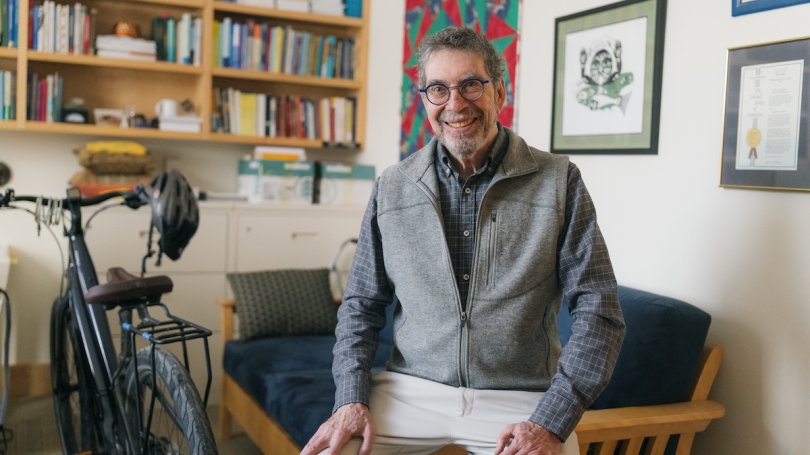
Menu
- About
- Departments & Programs
- Faculty Resources
- Governance
- Diversity
- News
Back to Top Nav
Back to Top Nav
Back to Top Nav
Back to Top Nav
The computer science and mathematics professor was honored for his scientific achievements and service as a public ambassador for math.
The American Association for the Advancement of Science has named Peter Winkler, the William Morrill Professor of Mathematics and Computer Science, an AAAS Fellow, one of the most distinguished honors in the scientific community.
AAAS fellows are recognized for their scientific and socially notable achievements spanning their careers. Winkler's citation reads: "For contributions to combinatorics, discrete mathematics, and probability, and for his extraordinary work as an ambassador for mathematics."
The world's largest general scientific society and publisher of the Science family of journals, the AAAS elected scientists, engineers, and innovators from around the world and across all disciplines to its 2022 class of fellows. The new class hails from academic institutions, laboratories and observatories, hospitals and medical centers, museums, global corporations, nonprofit organizations, and institutes and government agencies.
"I congratulate Peter on this well-deserved recognition, a terrific acknowledgement of his research advancing the fields of mathematics and computer science," says Jane Lipson, associate dean for the sciences. "The combination of his scientific achievements and his extraordinary ability to engage nonscientists in thinking about mathematics has been a wonderful boon to Dartmouth, and a force for good in the larger world."
At the Intersection of Three Research Areas
A member of both the Department of Mathematics and the Department of Computer Science, Winkler has authored more than 150 research papers, with a primary focus on how three areas of math intersect: probability theory, combinatorics, and theory of computing.
"For me, the main motivating question for my research is, 'Why is it that some things are easy to compute and others seem to be very hard?'" Winkler says. "There are a lot of mysteries. I use mathematics to try to understand this phenomenon. It's really fun to see something that you didn't understand before. Sometimes you go for a while banging your head against the wall, which makes it more gratifying."
"This is a well-deserved honor for our colleague Peter Winkler," says Sergi Elizalde, chair of the math department. "His contributions to combinatorics and probability are outstanding, including research for which he received the David P. Robbins Prize and Lester R. Ford Prize of the Mathematical Association of America."
Winkler traces his decision to immerse himself in math to a stint as a cryptologist in the Navy Reserve after college, when he arrived on a swampy island with the 1966 mathematics classic Non-standard Analysis by Abraham Robinson in tow.
"I realized that this is fantastic stuff, so when I got out of the service I went to work with the author at Yale," he recalls.
As digital computers rapidly evolved in the 1980s, Winkler broadened his focus to combinatorics, a discipline central to computer science that he describes as "the art of counting."
"At that time the theory of computing was in its infancy, and was very exciting," he says.
Winkler joined the Dartmouth faculty in 2004 after teaching positions at Stanford University and Emory University and serving as a research director at Bell Labs.
"I have a great group of colleagues and appreciate that Dartmouth is small enough that you can get to know people across departments," Winkler says. "Most research in math is collaborative. It's fun to work together with people who bring different skills."
Winkler also enjoys the "special reward" of teaching and mentoring, including math and computer science PhD students and undergraduate students working on independent projects. This spring he'll continue his tradition of teaching a graduate probability course themed around a topic of interest to both computer scientists and mathematicians, with a seminar on game theory.
Math's Public Ambassador
Winkler has collected his favorite math puzzles since he was a kid, a pastime that led him to devote much of his career to clueing people in on "the fun" of math and how it "can be helpful in our daily lives."
In academic circles he quickly became known for his vast collection of math puzzles, which led to three published collections, beginning in 2003 with Mathematical Puzzles: A Connoisseur's Collection.
In 2019, Winkler was named the Distinguished Chair for the Public Dissemination of Mathematics at the National Museum of Mathematics in New York. During the one-year residency, he taught mini-courses in puzzle solving; led special math-themed events at city high schools; and hosted a series of puzzle-themed dinners for executives on probability and decision theory.
Fellow math and computer science professor Daniel Rockmore reported on the intimate and popular "Probability and Intuition" sessions in The New Yorker's "Talk of the Town."
"With outreach, we sometimes forget about adults," Winkler says. "The people who came were from all different professions—a reporter, movie producer, cardiologist, investors—and they all enjoyed math. We talked about paradoxes, probabilities of events, and the role of randomness in the world—illustrated through puzzles."
Winkler also holds several patents in cryptography, holography, and distributed computing. In his free time, he plays piano and composes ragtime.
Winkler's 2010 book Bridge at the Enigma Club was a runner up for the 2011 Master Point Press Book of the Year award.
"The book introduces the methods of cryptology to the game of bridge," Winkler says. "When it came along I think people didn't realize there was a way to apply these methods legally."